Writer Judith Krantz, whose million-selling novels such as "Scruples" and "Princess Daisy" engrossed readers worldwide with their steamy tales of the rich and beautiful, died Saturday at her Bel-Air home. She was 91.
Krantz's son Tony Krantz, a TV executive, confirmed her death by natural causes on Sunday afternoon. He said he'd hoped to re-create the "Scruples" mini-series before her she died but it is still in the works.
"She had this rare combination of commercial and creative," he said.
Krantz wrote for Cosmopolitan and Ladies Home Journal magazines before discovering, at age 50, the talent for fiction that made her rich and famous like the characters she created.
Her first novel — "Scruples" in 1978 — became a best-seller, as did the nine that followed. Krantz's books have been translated into 52 languages and sold more than 85 million copies worldwide. They inspired a series of hit miniseries with the help of her husband, film and television producer Steve Krantz.
"I always ask myself if what I'm writing will satisfy a reader who's in a plane that can't land because of fog, or who's recovering from an operation in a hospital or who has to escape to a more delightful world for whatever reason," Krantz said in 1990. "That is the test."
While her work was decidedly less than highbrow, Krantz made no apologies for the steamy novels with titles like "Princess Daisy," ''Mistral's Daughter," ''Lovers," ''I'll Take Manhattan" and "The Jewels of Tessa Kent."
"I write the best books I know how," she once said. "I can't write any better than this."
She filled her stories with delicious details about her characters' lavish lifestyles — designer clothes, luxurious estates — and enviable romances. And she spared no specifics when it came to sex.
"If you're going to write a good erotic scene, you have to go into details," Krantz told the Los Angeles Times in 1990. "I don't believe in thunder and lightning and fireworks exploding. I think people want to know what's happening."
So appealing were her sensational stories of high-powered heroines that each novel was reimagined for television as an episodic miniseries. Steve Krantz, a millionaire in his own right through such productions as the animated film "Fritz the Cat," helped translate his wife's work for TV.
The author was also famous for living a glamorous life that paralleled that of her characters. Her home in Los Angeles' exclusive Bel Air community featured a soundproof writing room flanked by an immaculately kept garden. In her closet were many of the same designer-label clothes the characters in her books wore.
The eldest of three children, Krantz was born Judith Bluma Tarcher in 1928 in New York City. Her father owned an advertising agency and her mother worked as an attorney. Her brother, publisher Jeremy Tarcher, married the late ventriloquist Shari Lewis.
Growing up, Krantz was a precocious student at New York's exclusive Birch Wathen school, once describing herself as the youngest, smartest and shortest girl in her class. After skipping two grades, she enrolled at Wellesley College at age 16.
She was also by her own account an indifferent college student. She said she only enrolled at Wellesley "to date, read and graduate" and claimed to have set a record for her dorm by once dating 13 different men on 13 consecutive evenings.
"I got only one A-plus, and that was in English 101," she told The Boston Globe in 1982. "I had a B-minus average in English, my major, and made C's and C-minuses in everything else. But I didn't come here to get good marks."
When she could earn no better than a B in a short story class, she decided she wasn't good enough to write fiction.
"Just in time for my 50th birthday, I discovered that I could write fiction. My husband had urged me to try fiction for 15 years before I did," she was quoted in a profile on Wellesley's website in 2001. "I believed that if I couldn't write 'literature,' I shouldn't write at all."
"Now, I would say to young women, do something you have a true feeling for, no matter how little talent you may believe you have," she added. "Let no masterwork be your goal — a modest goal may lead you further than you dream."
Krantz had met her husband through her high school friend Barbara Walters, who introduced the two in 1953. They married the following year.
"I fell in love with him the minute I saw him," she once said.
Her husband died in 2007 at age 83. The couple had two sons, Tony and Nick, a stockbroker, and two grandchildren.
Her memoir, "Sex and Shopping: The Confessions of a Nice Jewish Girl," was published in 2001 and it reflected on her penchant for telling sex-drenched tales about the pretty and the privileged.
"In my opinion, there are two things women will always be interested in — sex and shopping," she said in 1994. "And if they're not, they've left out a large part of the fun in life."
This story includes biographical material compiled by former AP Entertainment Writer Sandy Cohen.
PARIS (AP) —
Reuters photographer Mohammed Salem captured this year’s prestigious World Press Photo of the Year award Thursday with a depiction of loss and sorrow in Gaza, a heartrending photo of a Palestinian woman cradling the body of her young niece. The photograph, taken in Khan Younis just days after Salem’s own child was born, shows 36-year-old Inas Abu Maamar holding five-year-old Saly, who was killed along with her mother and sister when an Israeli missile struck their home.
Salem, who is Palestinian, described this photo filed Nov. 2 last year, as a “powerful and sad moment that sums up the broader sense of what was happening in the Gaza Strip.”
The image ”truly encapsulates this sense of impact,” said global jury chair Fiona Shields, The Guardian newspaper's head of photography. “It is incredibly moving to view and at the same time an argument for peace, which is extremely powerful when peace can sometimes feel like an unlikely fantasy,” she added.
The World Press Photo jury praised the shot’s sense of care and respect and its offering of a “metaphorical and literal glimpse into unimaginable loss.”
This is not the first time Salem has been recognized for his work on the Israeli-Palestinian conflict; he received a World Press Photo award more than a decade ago for another depiction of the human toll of conflict in the Gaza strip.
In the three other global categories announced Thursday, South Africa’s Lee-Ann Olwage won Photo Story of the Year for her touching series “Valim-babena,” featured in GEO magazine. The project focused on the stigmatization of dementia in Madagascar, a topic she explored through intimate portraits of “Dada Paul” and his family. Lack of public awareness surrounding dementia means that people displaying symptoms of memory loss are often stigmatized.
In the series, “Dada Paul,” who has lived with dementia for 11 years, is tenderly cared for by his daughter Fara. One of the standout images in the series shows him preparing for church with his granddaughter Odliatemix, capturing moments of normalcy and warmth amidst the challenges of dementia.
Photographer Alejandro Cegarra, a Venezuelan native who migrated to Mexico in 2017, won the Long-Term Project award for “The Two Walls,” published by The New York Times and Bloomberg. Cegarra’s project, initiated in 2018, examines a shift in Mexico’s immigration policies, which have moved from being historically open to enforcing strict regulations at its southern border. The jury said the photographer's perspective as a migrant gave it a “sensitive," human-centered perspective, according to a press release.
Julia Kochetova of Ukraine won the Open Format award for “War Is Personal.” The project stood out from coverage of the ongoing conflict by offering a personal look at the harsh realities of war. On a dedicated website, she merged traditional photojournalism with a diary-like documentary style, incorporating photography, poetry, audio clips and music.
The Associated Press won the Open Format award in the regional Africa category with the multimedia story “Adrift,” created by journalists Renata Brito and Felipe Dana. The story investigates the fate of West African migrants who attempted to reach Europe via a treacherous Atlantic route but ended up on a ghost ship discovered off Tobago. The team’s compelling use of photography, cinematography and detailed narrative, enhanced by expert design and multimedia elements, highlights the perils faced by migrants and the human stories behind global migration issues.
The Associated Press' Ebrahim Noroozi won the Asia Stories award for his series “Afghanistan on the Edge,” which documents the country since the Taliban took over in August 2021.
World Press Photo is an independent, nonprofit organization based in the Netherlands, founded in 1955.
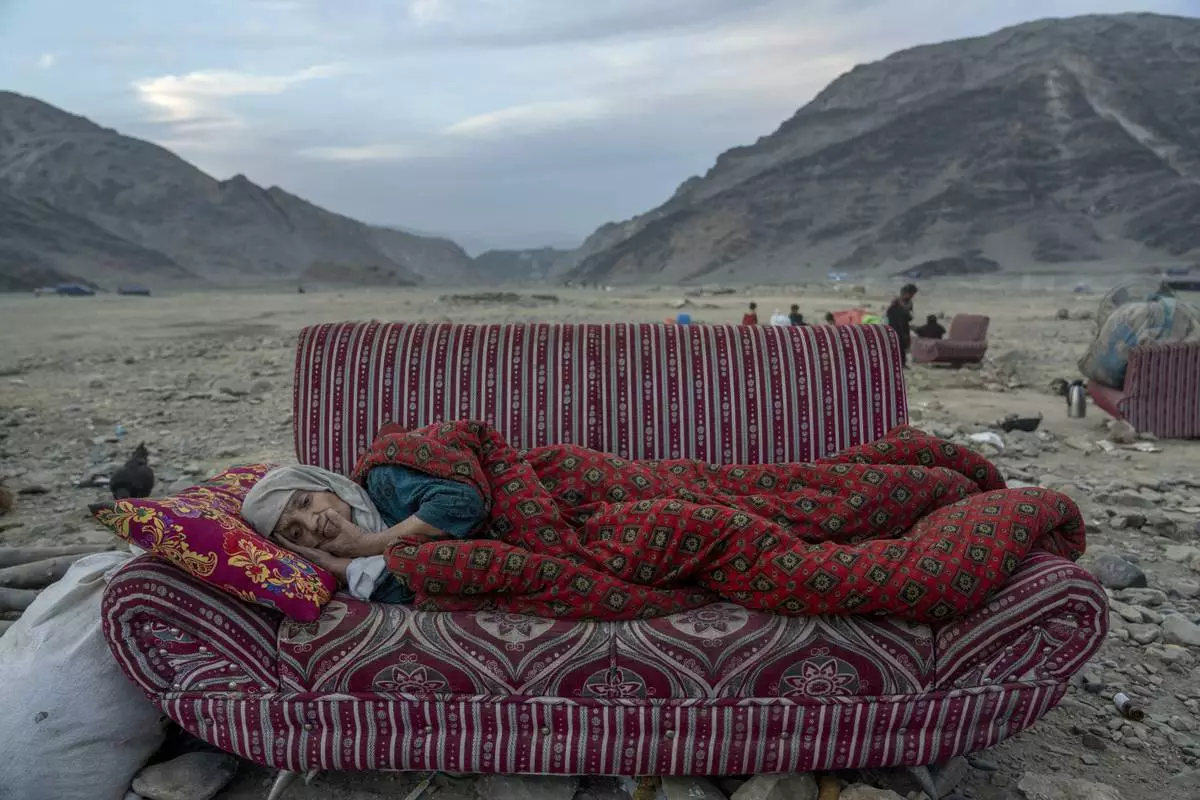
This image provided by World Press Photo is part of a series titled Afghanistan on the Edge by Ebrahim Noroozi, Associated Press, which won the World Press Photo Asia Series category and showsAn Afghan refugee rests in the desert next to a camp near the Torkham Pakistan-Afghanistan border, in Torkham, Afghanistan, Friday, Nov. 17, 2023. A huge number of Afghans refugees entered the Torkham border to return home hours before the expiration of a Pakistani government deadline for those who are in the country illegally to leave or face deportation. (AP Photo/Ebrahim Noroozi)
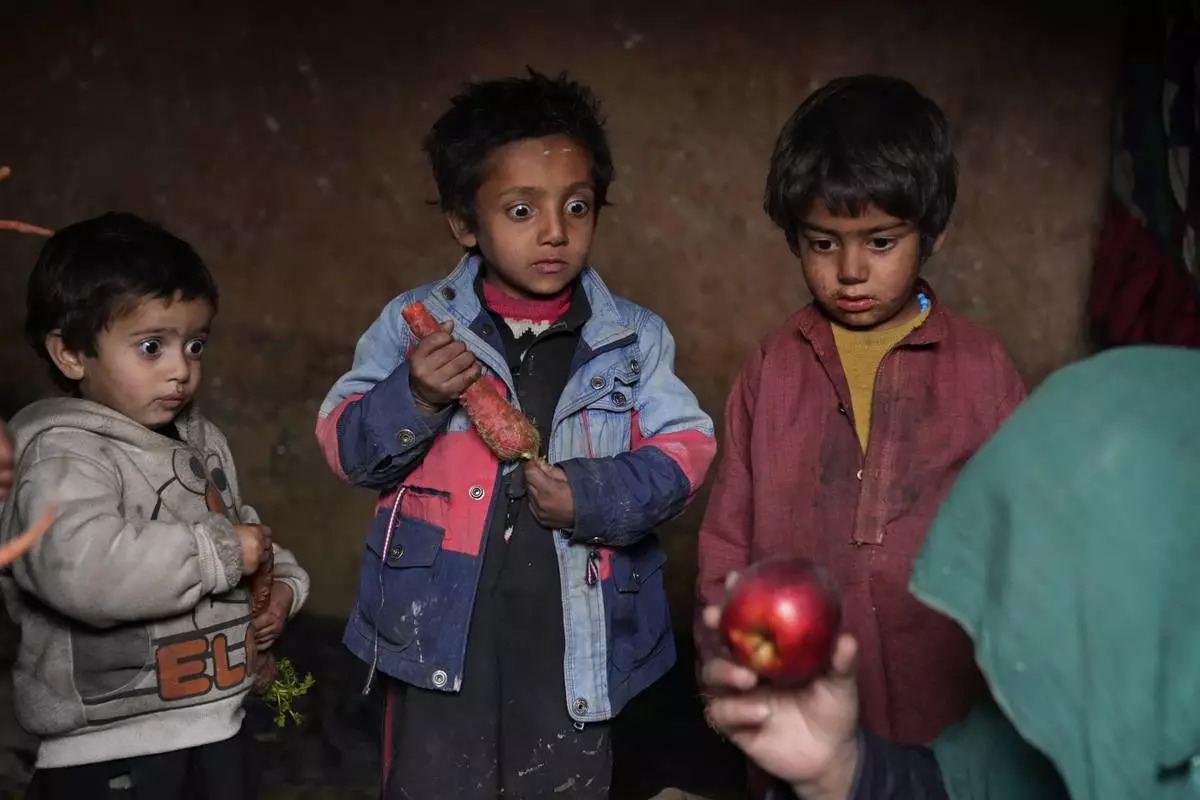
This image provided by World Press Photo is part of a series titled Afghanistan on the Edge by Ebrahim Noroozi, Associated Press, which won the World Press Photo Asia Series category and shows : Since the chaotic Taliban takeover of Kabul on Aug. 15, 2021, an already war-devastated economy once kept alive by international donations alone is now on the verge of collapse. There isn't enough money for hospitals. The World Health Organization is warning of millions of children suffering malnutrition, and the U.N. says 97% of Afghans will soon be living below the poverty line. Three Afghan internally displaced children look with surprise at an apple that their mother brought home after begging, in a camp on the outskirts of Kabul, Afghanistan, Thursday, Feb 2, 2023. (AP Photo/Ebrahim Noroozi)

This image provided by World Press Photo is part of a multimedia project by Associated Press' Renata Brito and Felipe Dana titled Adrift, won the World Press Photo Africa Regional Winner Open Format category and shows a mortuary technician opening the door of a refrigerator used to store the remains of migrants recovered from inside the Mauritania boat that appeared drifting near the island of Tobago, in Scarborough, Trinidad and Tobago, Tuesday, Jan. 25, 2022. In May 2021 a boat from Mauritania full of dead men was found off the coast of the Caribbean Island of Tobago. Who were these men and why were they on the other side of the Atlantic Ocean? Two visual journalists sought answers, uncovering a story about migrants from West Africa who seek opportunity in Europe via an increasingly popular but treacherous Atlantic route. (AP Photo/Felipe Dana)
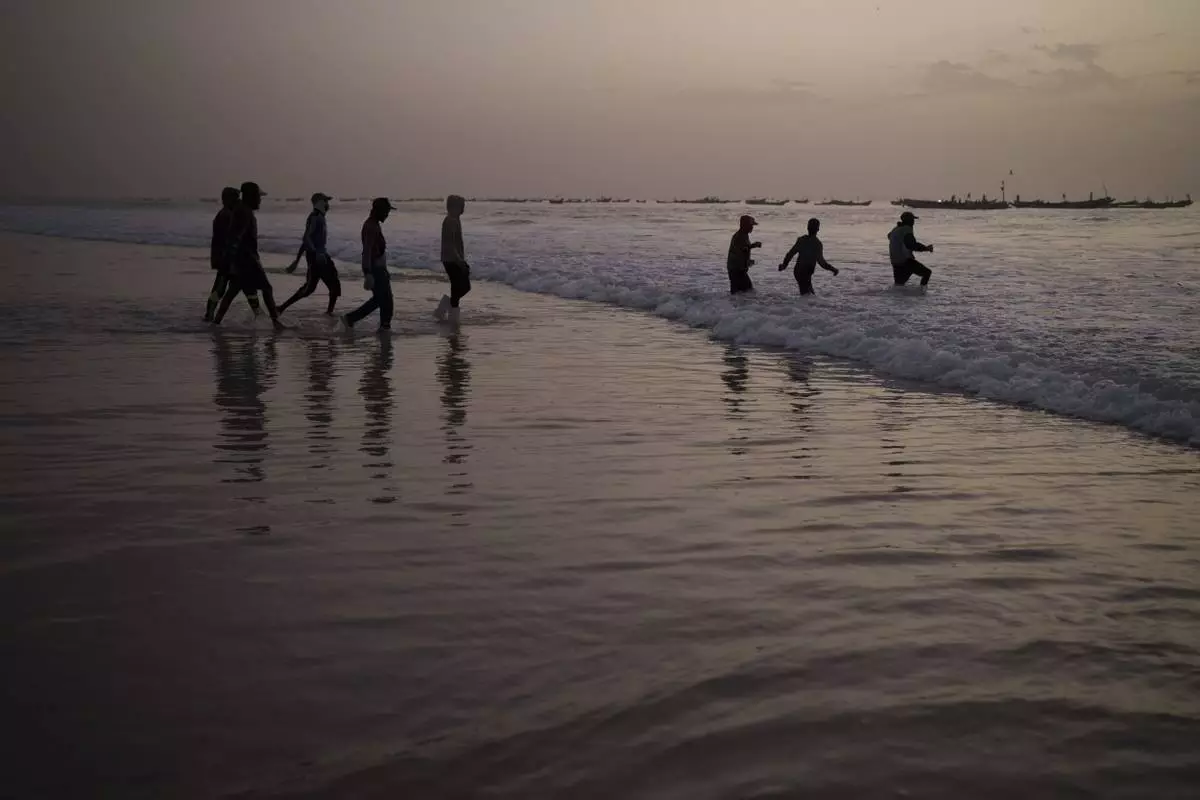
This image provided by World Press Photo is part of a multimedia project by Associated Press' Renata Brito and Felipe Dana titled Adrift, won the World Press Photo Africa Regional Winner Open Format category and shows young fishermen walk into the ocean to board an artisanal fishing boat in Nouakchott, Mauritania, Friday, Dec. 10, 2021. In May 2021 a boat from Mauritania full of dead men was found off the coast of the Caribbean Island of Tobago. Who were these men and why were they on the other side of the Atlantic Ocean? Two visual journalists sought answers, uncovering a story about migrants from West Africa who seek opportunity in Europe via an increasingly popular but treacherous Atlantic route. (AP Photo/Felipe Dana)

This image provided by World Press Photo is part of a multimedia project by Associated Press' Renata Brito and Felipe Dana titled Adrift, won the World Press Photo Africa Regional Winner Open Format category and shows Moussa Sako, an asylum-seeker from Mali, who survived 22 days aboard a Mauritanian boat drifting in the Atlantic Ocean covers his face during an interview with the Associated Press in Guadalajara, Spain, Sunday, Nov. 14, 2021. In May 2021 a boat from Mauritania full of dead men was found off the coast of the Caribbean Island of Tobago. Who were these men and why were they on the other side of the Atlantic Ocean? Two visual journalists sought answers, uncovering a story about migrants from West Africa who seek opportunity in Europe via an increasingly popular but treacherous Atlantic route. (AP Photo/Felipe Dana)

This image provided by World Press Photo and taken by Julia Kochetova is part of a series titled War is Personal which won the World Press Photo Open Format Award. Amidst tens of thousands of civilian and military casualties and an effective stalemate that has lasted for months, there are no signs of peace on the horizon for Russia's war in Ukraine. While news media updates its audience with statistics and maps, and international attention drifts elsewhere, the photographer has created a personal website that brings together photojournalism with the personal documentary style of a diary to show the world what it is like to live with war as an everyday reality. (Julia Kochetova/World Press Photo via AP)
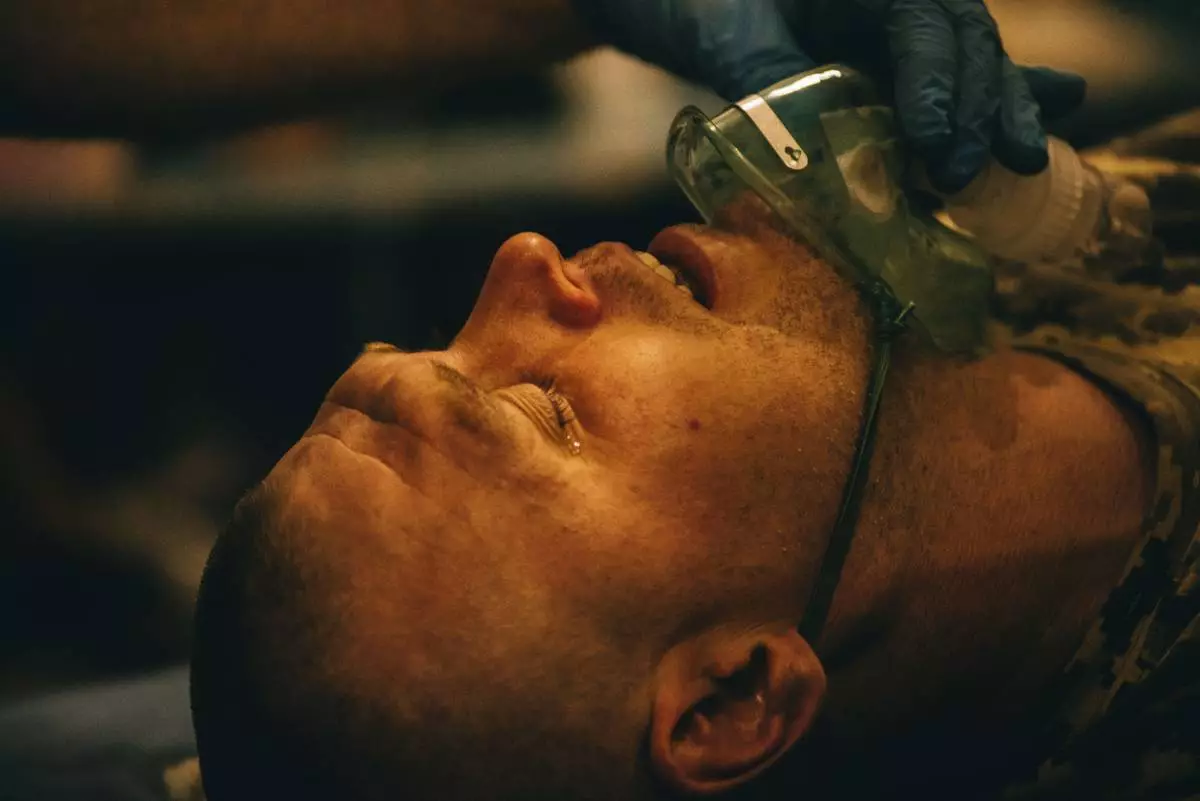
This image provided by World Press Photo and taken by Julia Kochetova is part of a series titled War is Personal which won the World Press Photo Open Format Award and shows a stabilization point near Bakhmut, Ukraine, of the 5th assault brigade and 77th brigade. Hospitalliers battalion - volunteer battalion of combat medics are helping here. Amidst tens of thousands of civilian and military casualties and an effective stalemate that has lasted for months, there are no signs of peace on the horizon for Russia's war in Ukraine. While news media updates its audience with statistics and maps, and international attention drifts elsewhere, the photographer has created a personal website that brings together photojournalism with the personal documentary style of a diary to show the world what it is like to live with war as an everyday reality. (Julia Kochetova/Der Spiegel/World Press Photo via AP)
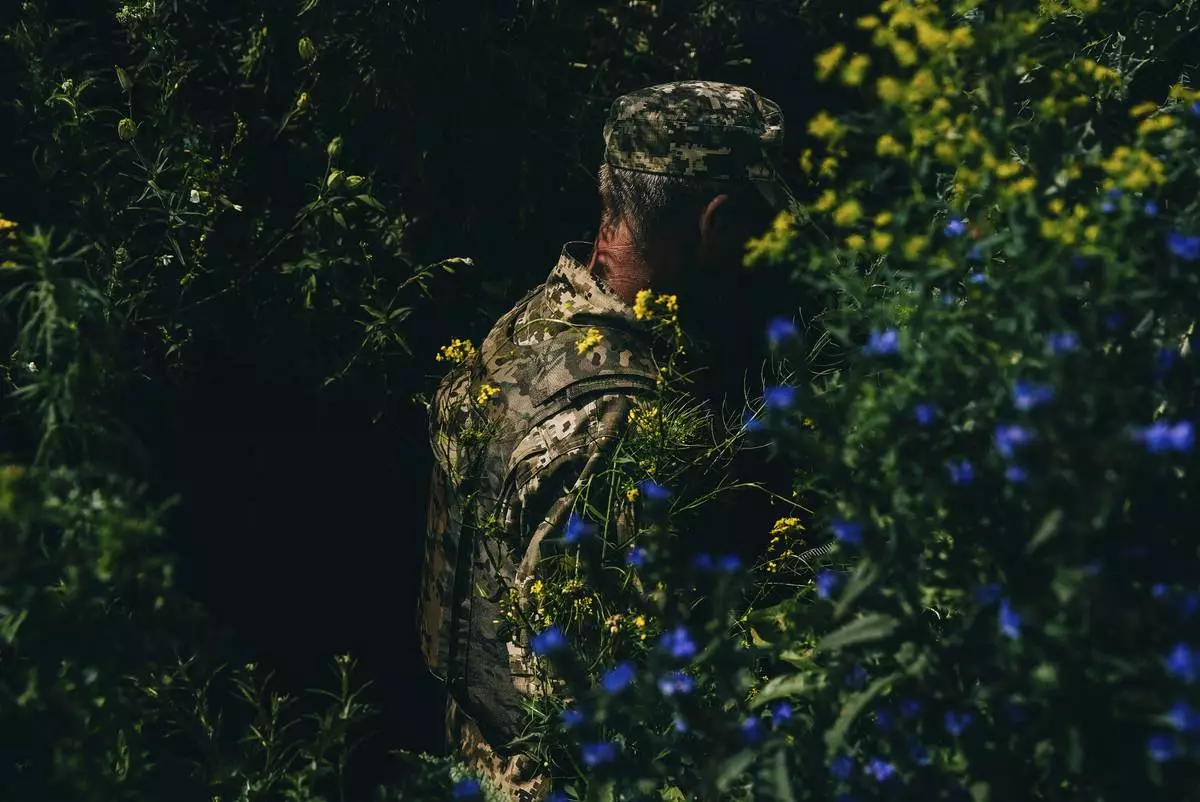
This image provided by World Press Photo and taken by Julia Kochetova is part of a series titled War is Personal which won the World Press Photo Open Format Award and shows the training of mobilized conscripts of 68th brigade in Donetsk region, not far from frontline. 68th brigade recently liberated Blagodatne village during the Ukrainian counter-offensive. The instructors came from US, working for NGO "Saber".Amidst tens of thousands of civilian and military casualties and an effective stalemate that has lasted for months, there are no signs of peace on the horizon for Russia's war in Ukraine. While news media updates its audience with statistics and maps, and international attention drifts elsewhere, the photographer has created a personal website that brings together photojournalism with the personal documentary style of a diary to show the world what it is like to live with war as an everyday reality. (Julia Kochetova/Der Spiegel/World Press Photo via AP)
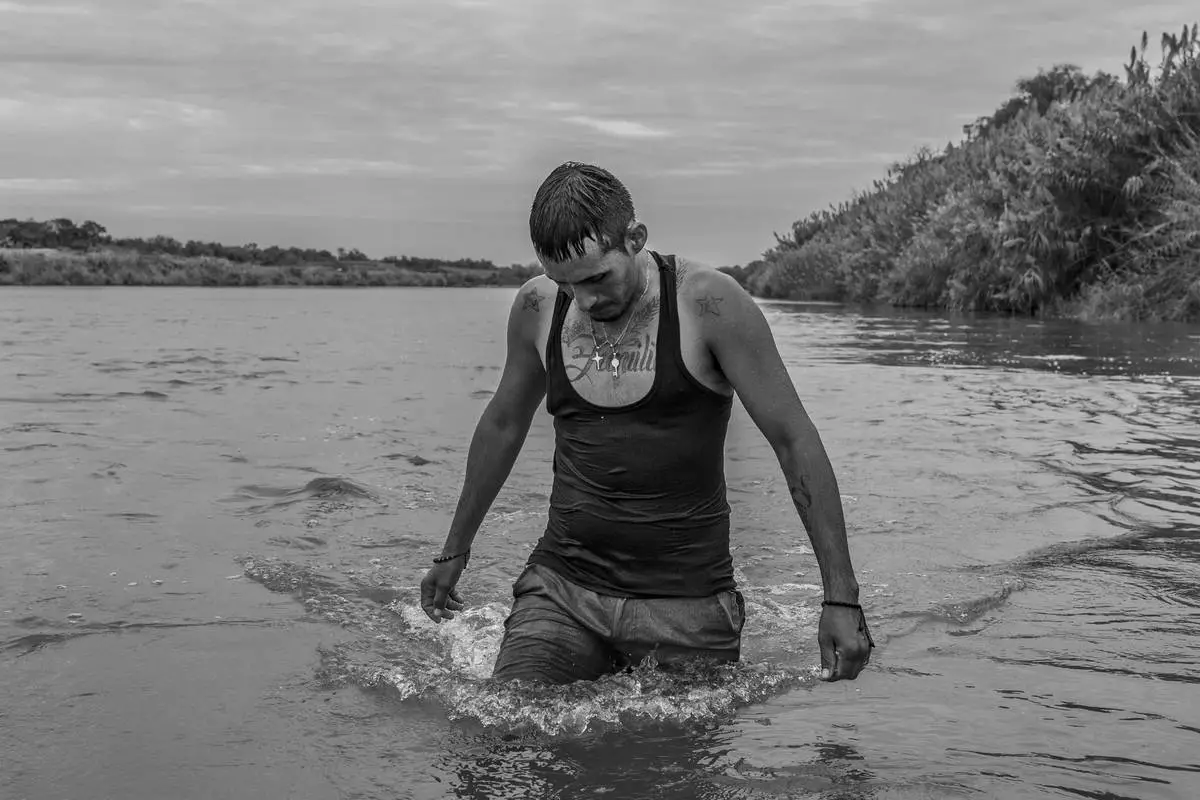
This image provided by World Press Photo and taken by Alejandro Cegarra for The New Times/Bloomberg is part of a series titled The Two Walls which won the World Press Photo Long-Term Project Award and shows Carlos Mendoza, a Venezuelan migrant, crossing the Rio Grande river to seek asylum in the United States. Piedras Negras, Mexico, 7 October 2023. (Alejandro Cegarra/The New York Times/Bloomberg/World Press Photo via AP)

This image provided by World Press Photo and taken by Alejandro Cegarra for The New Times/Bloomberg is part of a series titled The Two Walls which won the World Press Photo Long-Term Project Award and shows a migrant walking atop a freight train known as "The Beast." Migrants and asylum seekers lacking the financial resources to pay a smuggler often resort to using cargo trains to reach the United States border. This mode of transportation is very dangerous; over the years, hundreds have fallen onto the tracks and have been killed or maimed. Piedras Negras, Mexico, 8 October 2023. (Alejandro Cegarra/The New York Times/Bloomberg/World Press Photo via AP)
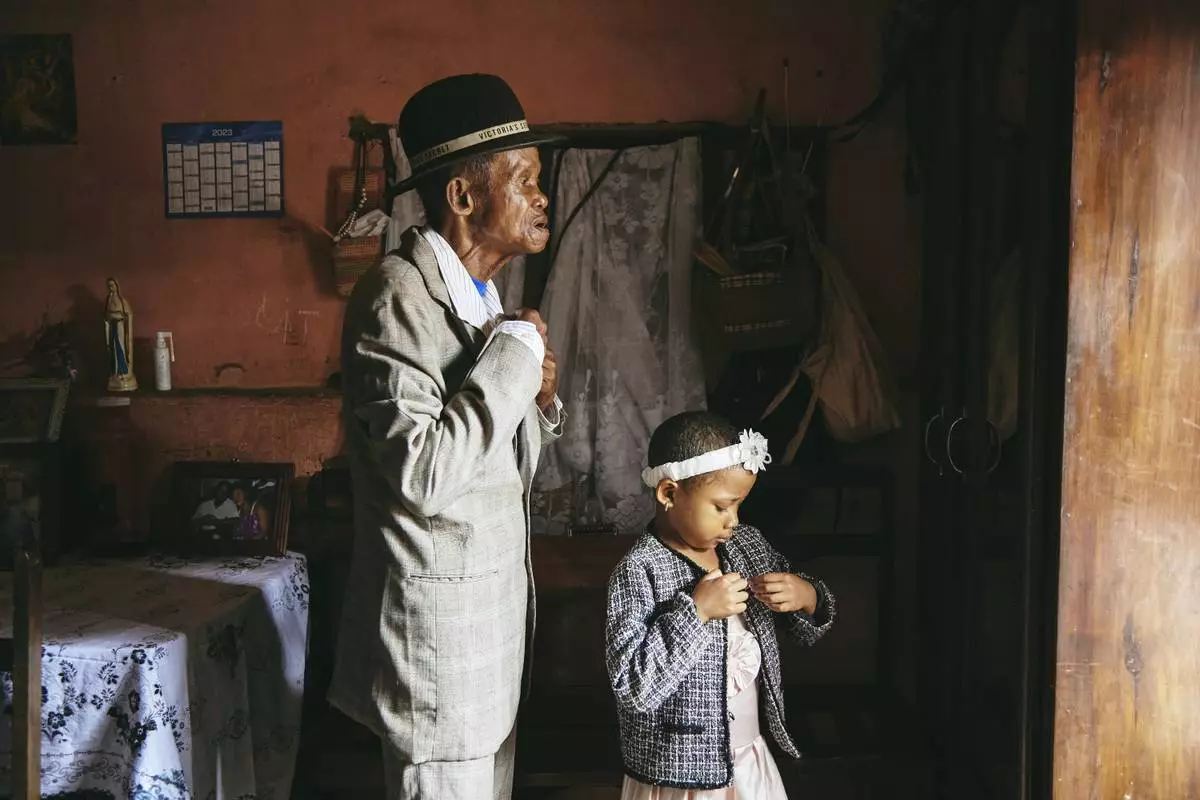
This image provided by World Press Photo and taken by Lee-Ann Olwage for GEO is part of a series titled Valim-babena which won the World Press Photo Story of the Year Award and shows Dada Paul Rakotazandriny (91), who is living with dementia, and his granddaughter, Odliatemix Rafaraniriana (5), get ready for church on Sunday morning at his home in Antananarivo, Madagascar. 12 March 2023. (Lee-Ann Olwage/Geo/World Press Photo via AP)
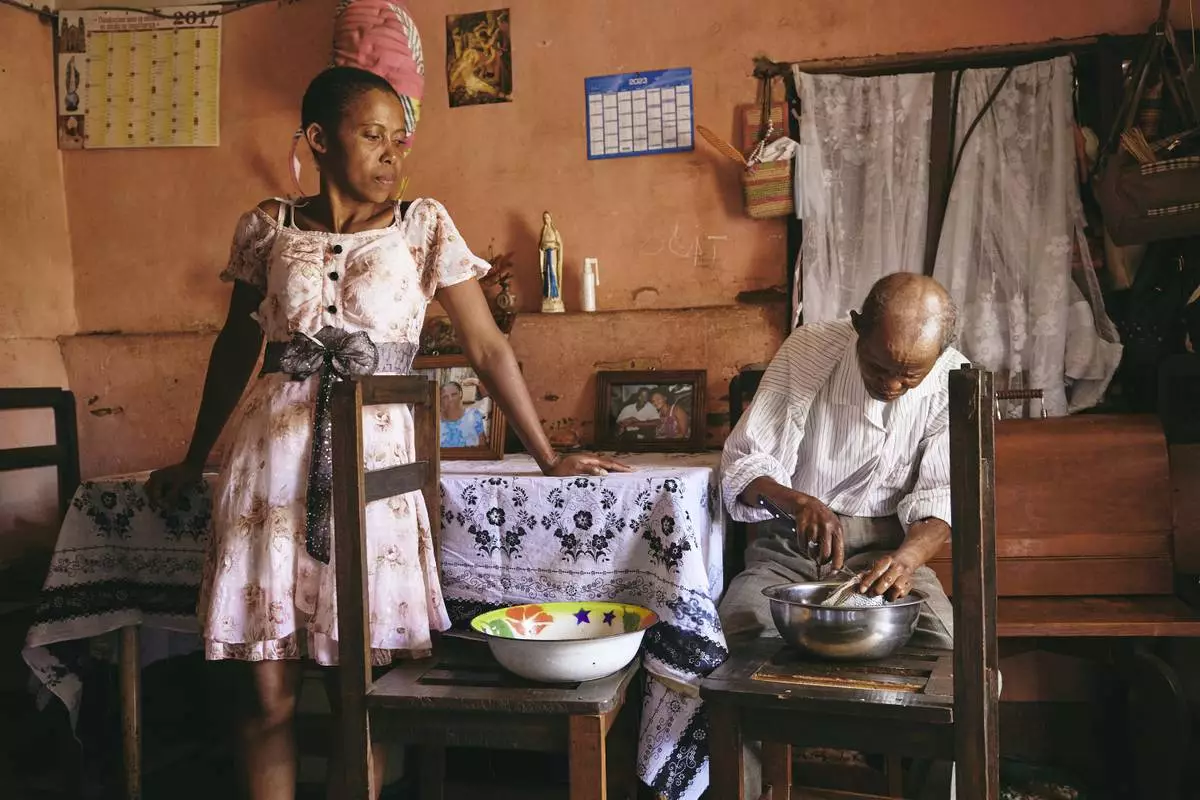
This image provided by World Press Photo and taken by Lee-Ann Olwage for GEO is part of a series titled Valim-babena which won the World Press Photo Story of the Year Award and shows Joeline (Fara) Rafaraniriana (41) watches her father, Dada Paul Rakotazandriny (91) clean fish at home on Sunday afternoon. A typical Sunday consists of the family attending church in the morning and spending time together in the afternoon. Fara works during the week and as the sole provider and carer for her daughter and father struggles to manage all her responsibilities in the absence of assistance by her siblings who live close by. Mandrosoa Ivato, Antananarivo, Madagascar. 12 March 2023. (Lee-Ann Olwage/Geo/World Press Photo via AP)
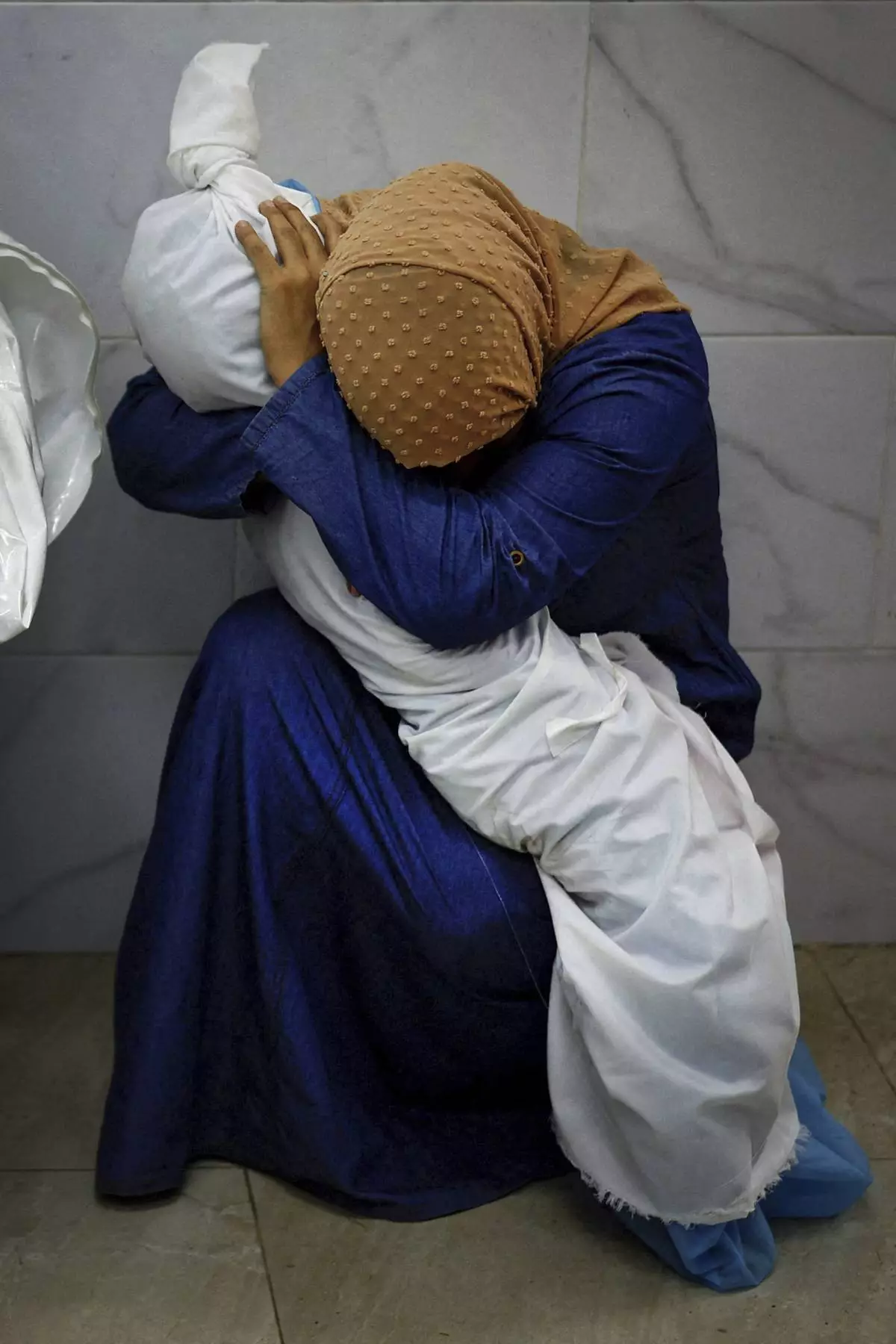
This image provided by World Press Photo and taken by Mohammed Salem of the Reuters news agency won the World Press Photo Award of the Year and shows Palestinian woman Inas Abu Maamar, 36, embracing the body of her 5-year-old niece Saly, who was killed in an Israeli strike, at Nasser hospital in Khan Younis in the southern Gaza Strip, October 17, 2023. (Mohammed Salem/Reuters/World Press Photo via AP)






















